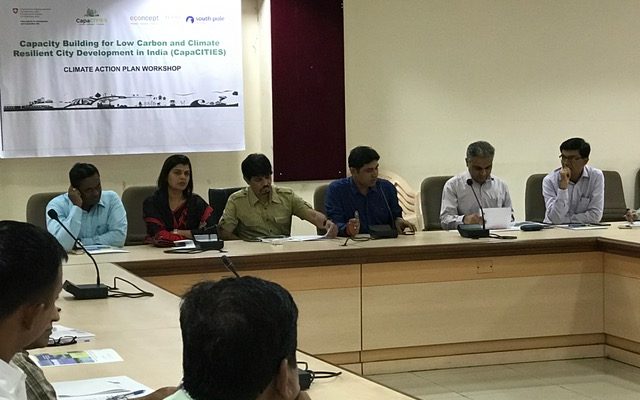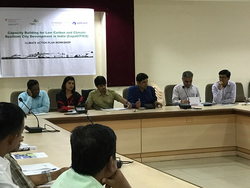First Instalment of the Climate Action Plan Workshop for CapaCITIES Project – Rajkot

As part of the CapaCITIES project supported by Swiss Agency for Development and Cooperation, ICLEI South Asia will develop a Climate Change Action Plan for the city of Rajkot, with interventions to build urban resilience in the city and address both climate mitigation and climate adaptation.
The first Climate Action Plan Workshop for CapaCITIES Project was conducted in Rajkot on July 17, 2017. This Workshop was a Shared Learning Dialogue (SLD) with the Stakeholder Committee and Climate Core Team of Rajkot. It is the first among a series of consultative workshops where the Climate Core Team and Stakeholder Committee will sit together to share thoughts and critical inputs facilitated by ICLEI South Asia. In this introductory meeting and workshop, the participants were introduced to the concept of climate action planning using the Climate Action Planning Methodology developed under the CapaCITIES Project. The following topics were discussed in the SLD:
- Climate change trends and projections for the city of Rajkot
- Identification of fragile urban systems in the city that may be impacted by the climate change projections
- Conducting a risk assessment of fragile urban systems
- Conducting a vulnerability assessment of fragile urban systems to identify the area and vulnerable actors
The workshop was attended by the Climate Core Team members of Rajkot City Municipal Corporation (CCMC) and members of the Stakeholder Group identified by Rajkot. More than 25 people were part of the workshop, including representatives from NGOs, business enterprises, as well as academicians. The Mayor, Dr. Jaiman Upadhyay, Dy. Mayor, Darshitaben Shah, Commissioner, Banchha Nidhi Pani and three Deputy Commissioners – Mr. Arun Mahesh Babu (east zone), Mr. C. K. Nandani (central zone) and Mr. R. J. Halani (west zone), were present in the meeting for the inaugural session and set the tone for the workshop.
The workshop used the City Climate Action Planning tools for assessing the climate risks faced by Rajkot, the existing fragile urban systems, the anticipated climate risks to these systems and identified the risks and vulnerability of these systems. With the help of these tools, the team identified five urban systems as fragile in Rajkot – health, transportation, water, sewerage and drainage, and solid waste management. For each system, a climate fragility statement was outlined on the basis of the future climate risks that have been assessed for Rajkot through secondary study. The risk assessment of these fragility statements was conducted through discussions with the stakeholder group. The risk assessment helped to shortlist the list of fragile urban systems and narrow it down to health, water supply, sewerage and drainage and solid waste management. The wards which are mainly affected by these fragile urban systems and their fragility and the primary actors who are impacted by them were also identified through discussions and group work.
It was decided that local city associates in Rajkot will visit each core team member to assess the primary actors who are at risk in the city because of the fragile urban systems. ICLEI will develop a basket of solutions based on the vulnerabilities identified through the workshop and will present it to the city in the next workshop to shortlist the relevant ones. These interventions will be prioritised and assessed for their techno-economic feasibility to form the City Climate Action Plan for Rajkot.




